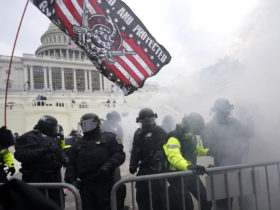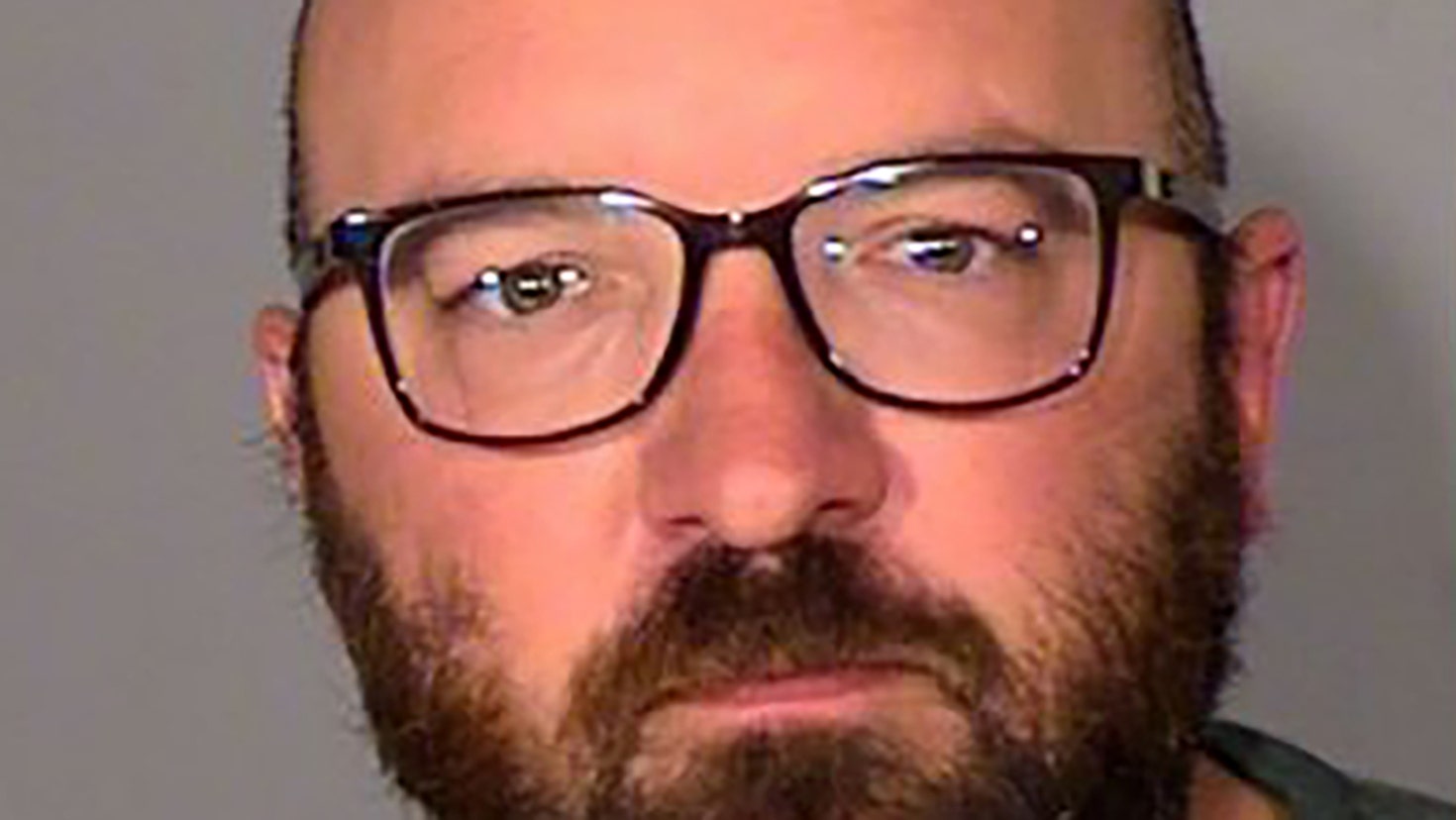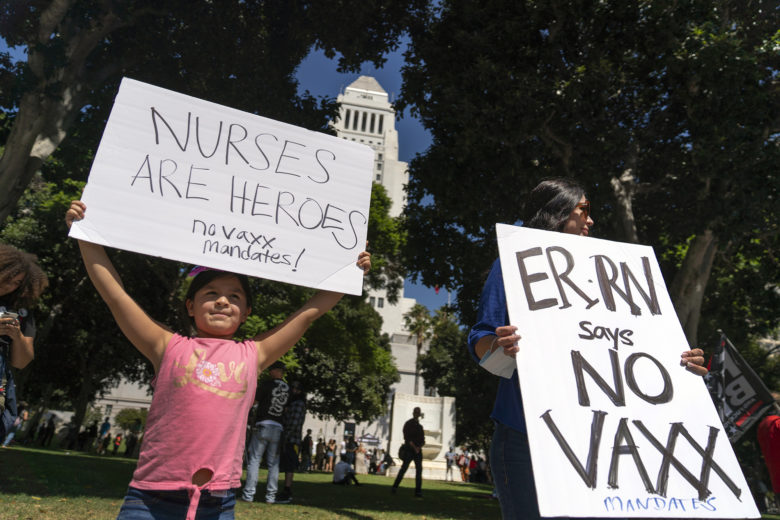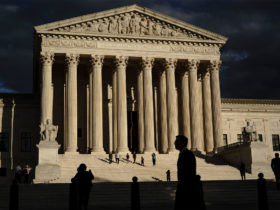Hospital staffing shortages due to COVID-19 vaccination disputes have continued across the U.S. this month, leaving patients untreated amid surges of the virus’ delta variant.
Health care workers against vaccine mandates have stood their ground, despite the fact that millions of Americans have been safely vaccinated against coronavirus with a Pfizer/BioNTech, Moderna or Johnson & Johnson shot at the hands of colleagues in their field.
In upstate New York, several maternity staff members resigned from Lewis County General Hospital, worsening an existing shortage and forcing the hospital to stop delivering babies and potentially curtail services in five other departments.
“The number of resignations received leaves us no choice but to pause delivering babies at Lewis County General Hospital,” CEO Gerald Cayer said at a September news conference. “It is my hope that the (state) Department of Health will work with us in pausing the service rather than closing the maternity department.”
“Essential health services are not at risk because of the mandate,” Cayer added. “The mandate ensures we will have a healthy workforce and we are not responsible for (causing COVID-19) transmission in or out of our facilities.”
More than 150 Houston Methodist hospital system workers were fired or resigned in June over a vaccine mandate after Texas Gov. Greg Abbott issued an executive order banning any entity from implementing mandates in the state, according to Houston Public Media.
Jennifer Bridges, a registered nurse in Houston who said she didn’t have confidence in the vaccine’s safety, has pledged to take the matter to the U.S. Supreme Court if necessary.
In Michigan, approximately 400 workers walked off the job at Henry Ford Health System at the beginning of the month rather than take a required COVID-19 vaccine, according to the Detroit Free Press and an additional 1,900 workers received exemptions from the health system’s vaccine requirement.

The publication reported that the workers who left made up about 1% of the workforce of 33,000 people, and Reuters reported that dozens of employees had filed a lawsuit against Henry Ford Health System in September.
Other hospital systems around the country have also gotten pushback on COVID-19 vaccine mandates, leading to employee firings.
In July, a study by The COVID States Project said that 27% of health care workers were unvaccinated and NPR reported in September that other research showed the rate of vaccination has been lower among nurses and nursing home aides.
There was a widespread shortage of nurses even before the pandemic, according to NPR.
In a Sept. 1 news release, the American Nurses Association (ANA) – which represents the interests of the nation’s more than 4 million nurses – penned a letter to U.S. Department of Health and Human Services (HHS) Secretary Xavier Becerra, calling on the administration to declare the nurse staffing shortage a national crisis and take action.
“The nation’s health care delivery systems are overwhelmed, and nurses are tired and frustrated as this persistent pandemic rages on with no end in sight. Nurses alone cannot solve this long-standing issue and it is not our burden to carry,” ANA President Ernest Grant said in a statement. “If we truly value the immeasurable contributions of the nursing workforce, then it is imperative that HHS utilize all available authorities to address this issue.”
One of the ANA’s policy solutions was to “educate the nation on the importance of the COVID-19 vaccine.”

Health leaders said exhausted nurses are quitting or retiring over the crisis and some are leaving for lucrative temporary, traveling positions.
The ongoing pandemic and surges in infections have led to burnout, though issues reportedly extend further back than last year.
“The current nursing crisis the state of Oregon is facing … has been decades in the making,” Natasha Schwartz, a member of the Oregon Nurses Association Board of Directors, said during a news conference at the beginning of the month. “As we see a small number of nurses potentially leave the profession due to their decision to decline the vaccination, we are also concerned burnout will lead to an even larger number of nurses leaving the bedside – and in Oregon, we will not be able to educate a large enough number of nurses to replace them.”
Officials from the Oregon Nurses Association said 60% of nurses at the state’s largest hospital, Oregon Health & Science University, indicated that they are considering leaving the profession entirely.
Patients have felt the effect.
In September, an Alabama man – Ray Martin DeMonia – died following a cardiac event after being turned away by dozens of hospitals filled with COVID-19 patients.
“In honor of Ray, please get vaccinated if you have not, in an effort to free up resources for non-COVID related emergencies,” his obituary read.
Another man who had suffered a heart attack was also bounced from six hospitals in New Orleans before finding an emergency room that could take him.

“It’s a real dire situation,” Joe Kanter, Louisiana’s chief public health officer, told The Associated Press at the time. “There’s just not enough qualified staff in the state right now to care for all these patients.”
Pfizer is approved by the U.S. Food and Drug Administration and Moderna and Johnson & Johnson are authorized for emergency use.
The Centers for Disease Control and Prevention has said that, while a small number of health problems have been reported, COVID-19 vaccines are safe and highly effective.
There are more than 189 million Americans fully vaccinated in the U.S. and COVID-19 cases have fallen since September.
More than 726,000 people have died from the virus in the U.S., according to data from the John’s Hopkins Coronavirus Resource Center.











Leave a Reply